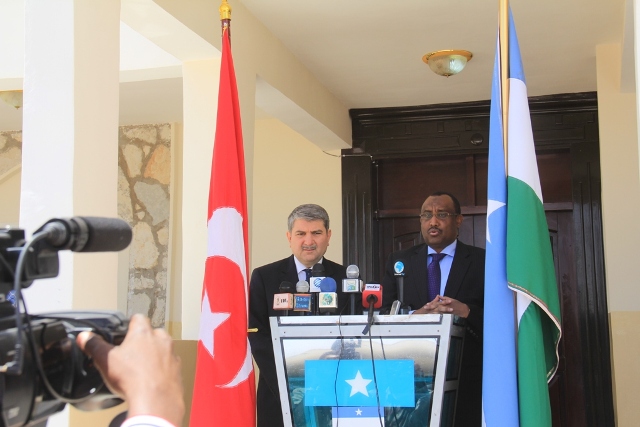(Reuters) – An expected drive to purge Islamist rebels from southern Somalia risks pushing them north into an area at the tip of the Horn of Africa better known for its coastal pirates than al Shabaab insurgents.
Semi-autonomous Puntland state, where one-third of Somalia’s population lives, needs help from the African peacekeeping force AMISOM to secure its border with southern provinces, its regional president Abdiweli Mohamed Ali said on Wednesday.
A new push to rout al Shabaab militants from urban redoubts in southern Somalia has been expected since Ethiopian troops joined AMISOM earlier this year, but it has not yet come.
“It is obvious that some (al Shabaab) will seek refuge in the very difficult terrain in Puntland, particularly the Galgala mountains,” Ali told Reuters by telephone. He was referring to a small range of mountains where some fighters are operating.
Reeling from militant attacks on its doorstep, the central government in Mogadishu wants the al Qaeda-linked insurgents expelled from their southern strongholds this year as it struggles to shake off the tag of a failed state.
Ali’s concerns underscore a worry that the offensive may destabilize Puntland, a relatively settled region that al Shabaab rebels slowly began infiltrating after they were flushed out of Mogadishu in mid-2011.
Puntland blamed al Shabaab for a rare car bomb attack in December in the port town of Bosasso which killed seven people.
Attacks by Somali pirates have fallen in recent years due to increased naval patrols and armed security teams on ships.
Although al Shabaab numbers have hitherto been limited, Puntland authorities and Western diplomats have voiced concern the Islamists might seek to strengthen ties with al Qaeda cells across the narrow Gulf of Aden in Yemen.
UNEASY RELATIONSHIP
Under Puntland’s previous leader, ties with Mogadishu became strained and the region largely operated as an independent entity. The January 8 election of Ali, a former prime minister in the federal government, raised hopes of improved relations.
Ali bemoaned the lack of military aid for his administration to build up his security forces and the sparse information from Mogadishu about its campaign against al Shabaab.
“We have had no communication about this operation. We have a common enemy, al Shabaab, of course we should be consulted,” the United States-educated leader said.
Ali said the unequal distribution of aid between Mogadishu and the regions was not limited to military funds and federal government revenues and foreign aid, of which Somalia is among the world’s biggest recipients, must also be more fairly shared.
That echoed complaints by Ali’s predecessor Abdirahman Mohamud Farole, who in August cut ties with Mogadishu in protest and accused the central government of undermining plans to create a federal system.
Mogadishu has promised to share power and resources in the country seen as one of the last frontiers in the hunt for oil and gas in east Africa. But distrust of central government still threatens fragile security gains.
Ali said he was open to talks on how to divide power between the center and the regions, a thorny issue the current provisional constitution failed to address.
Who can issue hydrocarbon licenses and how to share future revenues are unresolved “contentious issues,” he said.
“Federalism is now the law of the land. The question is to what extent powers are devolved.”
Source: Reuters
